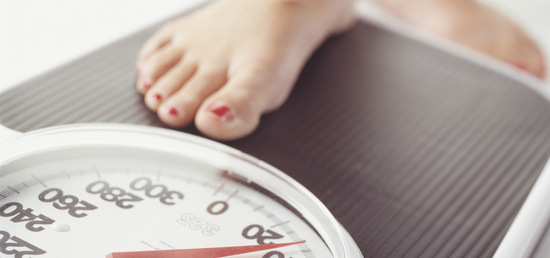
If losing weight is on your list of new year’s resolutions, you might want to consider stepping on the scale more regularly — new research suggests it could help you shed those pounds.
The study, published in the journal PLOS ONE, found that the more frequently dieters weighed themselves the more weight they lost, and if participants went more than a week without weighing themselves, they gained weight.
Past research has shown that regular self-monitoring of body weight is associated with more successful weight loss and maintenance. Frequent weigh-ins heighten self-awareness and facilitate earlier detection of subtle increases in weight, and can also help to prevent weight regain after weight loss.
However, previous studies have not examined whether varying the frequency of self-weighing influences weight-loss success, or whether there is a minimum or optimal frequency of self-weighing.
Dose-response relationship between self-weighing frequency and weight change
For the study, researchers from Tempere University of Technology in Finland analyzed 2,838 weight measurements (up to a years’ worth of weigh-ins) from 40 overweight individuals (with a body mass index of 25 and over) participating in a workplace health promotion program. All participants had previously indicated that weight loss was a personal goal or concern.
Prior to the intervention, participants were provided with weight scales and instructed to sign into a mobile phone application at each weigh-in. The weighing data were extracted from the mobile phone application upon follow-up one year later.
The results showed that weight loss was directly related to how often individuals weighed themselves. Specifically, the researchers found a significant dose-response relationship between self-weighing frequency and weight change.
“Weight increased linearly with the number of days between consecutive weight measurements: the more days between weight measurements, the larger the weight gain,” the authors report. The average time that participants could go between weighing without gaining weight was 5.8 days, or about a weekly weigh-in.
Because the study was observational in design, it cannot prove a causal relationship between regular weigh-ins and successful weight-loss; other explanations for the findings are possible. For example, it could be that less serious dieters weighed themselves less. Additionally, it is not known whether changes in weight or changes in self-weighing frequency occurred first — dieters who stop losing weight might stop weighing themselves.
Self-monitoring techniques for weight loss
Based on their findings, the researchers recommend that you weigh yourself at least once a week if you wish to lose weight. Weighing yourself everyday may help you stay on track, but you should choose one day each week to record your weight to get the most reliable measure. A previous study by the same research team found that your weight naturally fluctuates throughout the week and that most people weigh the least on Wednesday.
“The bottom line is: If you want to lose weight, it’s best to weigh yourself every day,” advises Dr. Brian Wansink, PhD, Director of the Cornell Food and Brand Lab. “But if you weigh yourself only once a week, do it on Wednesday because that will give you the most accurate reading.”
While regularly stepping on the scale appears to be an effective weight-loss technique, the authors caution that “for some individuals, frequent self-weighing may be associated with negative outcomes such as increased body dissatisfaction or decreased self-esteem when progressing too slowly towards or failing in weight loss goals.”
Besides frequently checking your weight, experts also recommend engaging in other self-monitoring techniques, including:
- Food diaries
- Exercise logs
- Equipment such as pedometers, accelerometers and metabolic devices
Just like frequent weigh-ins, the goal of these self-monitoring techniques is to increase self-awareness of target behaviors and outcomes, thus serving as an early warning system if problems are arising and as a way to keep track of your success.
